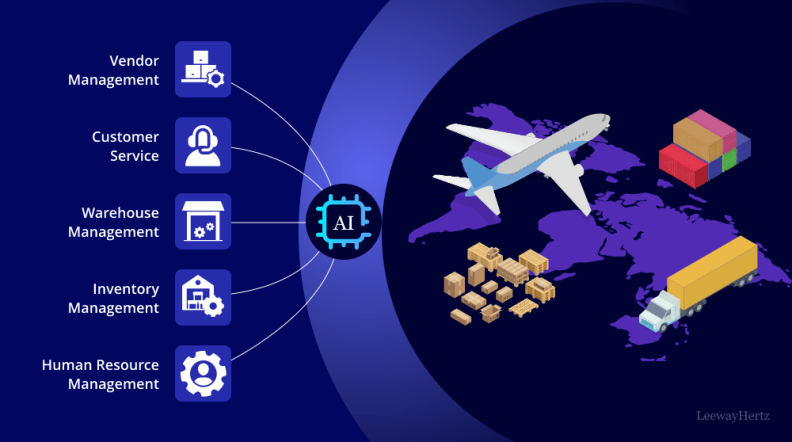AI in Logistics: Revolutionizing Efficiency and Innovation






The integration of AI into logistics is shifting the dynamics of how goods and services are delivered across the globe. By integrating AI, companies are achieving unprecedented levels of efficiency and innovation. Route optimization algorithms, for instance, are significantly reducing travel times and fuel consumption, making deliveries faster and more eco-friendly.
Moreover, the adoption of AI technologies is not just about enhancing current processes but also about opening new avenues for innovation within the logistics sector. Through AI, logistics companies are able to predict trends, automate mundane tasks, and offer more personalized customer experiences, setting new standards in the industry.
The Impact of AI on the Logistics Industry
The influence of AI on the logistics industry has been transformative, streamlining operations and setting new benchmarks for efficiency and customer satisfaction.
The Role of AI in Streamlining Operations
AI plays a crucial role in streamlining logistics operations, particularly in improving customer service. Through intelligent algorithms, logistics firms can now offer real-time tracking, predict issues before they arise, and provide instantaneous customer support. This level of service was unthinkable just a few years ago and is setting a new standard in customer expectations.
Predictive Analytics: Forecasting Demand and Supply
Predictive analytics, powered by AI, is revolutionizing supply chain management and planning. AI in predictive analytics allows for more accurate demand forecasting by analyzing vast amounts of manual data and identifying patterns that humans might overlook. This leads to an improved supply chain with less waste and more efficiency. Companies are now able to adjust their supply chain in real-time, ensuring they meet customer demand without overstocking.
Autonomous Vehicles: Transforming Delivery Processes
AI systems are at the heart of the autonomous vehicle revolution in logistics. These vehicles are transforming delivery processes by making them safer, more efficient, and less reliant on human intervention. From drones to self-driving trucks, AI is enabling round-the-clock deliveries, reducing delivery times, and significantly lowering operational costs.
Big Data: Enabling Smarter Decision-Making
The utilization of big data in logistics, facilitated by AI, is enabling smarter decision-making at all levels. By analyzing large datasets, logistics companies can uncover insights related to customer demand, transportation costs, and potential bottlenecks. This capability allows for more informed decisions, optimizing operations, and enhancing overall supply chain efficiency.
Enhancing Supply Chain Management with AI
AI and machine learning are pivotal in transforming supply chains, making them more responsive to customer demand while simultaneously reducing transportation costs.
Automated Warehouses: The Future of Storage
The integration of AI in the logistics industry is perhaps most visible in the area of warehouse automation. Automated warehouses, powered by AI, are redefining storage and inventory management, allowing for faster retrieval times and reducing human error. This not only improves operational efficiency but also significantly lowers costs, heralding a new era in supply chain management.
Optimizing the Shipping Process: A Smart Approach
By leveraging AI, logistics companies are adopting a smarter approach to shipping. AI algorithms optimize shipping routes in real-time, taking into account weather conditions, traffic patterns, and delivery urgencies. This ensures that goods are delivered in the most efficient manner possible, enhancing customer satisfaction and operational efficiency.
Inventory Management: Accuracy and Efficiency
AI in inventory management is leading to unprecedented levels of accuracy and efficiency. By constantly monitoring stock levels and predicting future demand, AI ensures that supply chain efficiency is maximized. This not only prevents stockouts and overstocking but also contributes to a more streamlined supply chain that can adapt to changing market conditions swiftly.
Workforce Management: AI for Human Resource Optimization
In the realm of workforce management, AI is enabling logistics companies to optimize their human resources. By analyzing traffic patterns and delivery schedules, AI can predict the optimal times for deliveries, thereby scheduling human workers more effectively. This not only improves operational efficiency but also helps in the strategic hiring and training of staff, ensuring that the workforce is always aligned with current needs.
The Strategic Advantages of Deploying AI in Logistics
Deploying AI in logistics offers strategic advantages, including enhanced data quality and improved safety measures, leading to more precise and cost-effective operations.
Enriching Data Quality for Better Insight
Logistics companies leveraging AI are seeing a significant improvement in the quality of data they collect. This enriched data provides deeper insights into every aspect of their operations, from warehouse management to customer delivery preferences. These insights allow for better strategic planning and decision-making, giving companies a competitive edge in the market.
Enhanced Safety Measures through AI
AI is playing a critical role in enhancing safety measures within logistics, particularly in warehouse management. By monitoring equipment and predicting failures before they happen, AI helps in maintaining a safer working environment. This proactive approach to safety not only protects employees but also reduces downtime, contributing to a more efficient operation.
Achieving Timeless Delivery with Precision
AI systems are enabling logistics companies to achieve what was once considered impossible – timeless delivery with precision. Through advanced algorithms, companies can now ensure that deliveries are made at the exact required moment, enhancing customer satisfaction and setting new standards in the logistics sector. This precision, coupled with the efficiency AI brings, is redefining the expectations for delivery services worldwide.
Reducing Operational Costs through Smart Solutions
Artificial Intelligence (AI) is streamlining logistics operations, significantly reducing operational costs. By leveraging predictive maintenance, companies are minimizing unplanned downtime and extending the lifespan of their equipment. Data integration from various sources, including historical sales data, facilitates route optimization, ensuring that delivery routes are both time and fuel-efficient. Moreover, AI’s capability to analyze data from various sources allows for precise demand forecasting, further enhancing inventory management and reducing waste. These smart solutions not only lower operational costs but also boost overall efficiency.
Implementing AI for Logistic Success
Successful AI implementation in logistics hinges on identifying specific operational challenges and deploying targeted AI solutions. Incorporating AI into logistics operations enhances supply chain management, optimizes shipping processes, and improves inventory accuracy. This strategic integration of AI not only streamlines operations but also contributes to substantial cost savings and improved customer satisfaction.
Identifying and Addressing Major Issues with AI
Integrating AI into logistics involves a detailed analysis of the supply chain management system to pinpoint inefficiencies and areas for improvement. By integrating AI, companies can automate and optimize various processes, from inventory management to demand forecasting. This proactive approach helps in addressing potential disruptions and bottlenecks, ensuring a smooth and efficient supply chain. The key lies in leveraging AI’s capabilities to enhance decision-making and operational efficiency.
Evaluating AI Solutions: Making the Right Choice
Choosing the right AI solutions for logistics involves a comprehensive evaluation of the company’s specific needs and challenges. Effective AI implementation requires integrating data from various sources, including historical sales data and predictive maintenance insights, to optimize operations such as route optimization and inventory management. Data integration plays a critical role in this process, ensuring that all decisions are informed by accurate and up-to-date information. The goal is to select AI tools that align with the company’s strategic objectives and deliver tangible benefits.
Step-by-Step AI Implementation Strategy
To successfully implement AI in logistics, companies should follow a systematic approach. Initially, it’s crucial to assess the existing infrastructure and determine the readiness of supply chains for AI integration. The next steps involve identifying specific areas where AI can add value, followed by a phased implementation of AI technologies. Continuous monitoring and optimization are essential to ensure that AI implementation meets the set objectives and contributes to improved efficiency and cost savings. This strategic approach facilitates a seamless transition to AI-driven logistics operations.
Starting Small and Scaling: A Pragmatic Approach
Adopting AI in logistics does not necessarily require a complete overhaul from the outset. A pragmatic approach involves starting with small-scale implementations, focusing on areas with the highest potential for immediate impact. This allows companies to evaluate the effectiveness of AI solutions in real-world scenarios and make necessary adjustments. As confidence in AI’s capabilities grows, logistics firms can gradually scale up their AI initiatives, expanding their use to cover more aspects of their operations. This step-wise adoption ensures a smooth transition and maximizes the benefits of AI in logistics.
Leveraging AI for Advanced Logistics Operations
AI is revolutionizing logistics and supply chain management by enhancing operational efficiency and ensuring optimal customer satisfaction. Through advanced AI applications, logistics operations are becoming more efficient, leading to significant improvements in customer service. This strategic application of AI in logistics not only streamlines operations but also sets new benchmarks in service delivery.
Automated Document Processing: Efficiency in Administration
Automated document processing, powered by AI, is dramatically improving administrative efficiency in logistics. This technology enables the rapid and accurate processing of vast volumes of documents, from shipping labels to invoices, reducing manual effort and minimizing errors. The result is a more streamlined administrative process, allowing logistics companies to focus on core operational efficiencies.
Customer Service Chatbots: Enhancing Engagement
AI-driven customer service chatbots are transforming how logistics companies interact with their clients. These chatbots provide instant, 24/7 responses to customer inquiries, from tracking shipments to addressing service issues. This not only enhances customer engagement but also significantly reduces the workload on customer service teams, allowing them to concentrate on more complex queries.
Predictive Maintenance: Proactive Problem-Solving
Implementing AI technology for predictive maintenance is enabling logistics companies to anticipate equipment failures before they occur. This proactive approach to maintenance helps in scheduling repairs and replacements during non-peak times, minimizing downtime and disruption to operations. Predictive maintenance is a testament to how AI can significantly improve operational reliability and efficiency in logistics.
Dynamic Pricing: Market-Responsive Strategies
Logistics companies are utilizing machine learning algorithms to implement dynamic pricing strategies, allowing them to adjust prices in real-time based on historical data and market demand. This approach not only maximizes profitability but also enhances competitiveness by offering prices that are in tune with current market conditions. Dynamic pricing demonstrates the power of AI in creating flexible and responsive pricing strategies.
AI Use Cases Transforming Logistics
AI algorithms are at the forefront of transforming logistics, making operations more efficient and customer-centric. From optimizing delivery routes to enhancing supply chain management, AI is paving the way for innovative solutions that promise to redefine the logistics industry.
Delivery Drones: Redefining Last-Mile Delivery
Delivery drones are set to revolutionize the last-mile delivery process, offering a fast, cost-effective, and environmentally friendly alternative to traditional delivery methods. These drones, guided by sophisticated AI algorithms, can navigate complex urban environments to deliver packages directly to customers’ doorsteps. This innovation not only enhances delivery efficiency but also opens up new possibilities for e-commerce and logistics companies.
Supply Planning: AI-Driven Forecasting
AI-driven forecasting tools are transforming supply planning by leveraging vast amounts of data to predict future demand accurately. These tools analyze patterns in historical sales data, market trends, and other relevant factors to ensure that inventory levels are optimized to meet anticipated demand. This precision in supply planning reduces the risk of stockouts and excess inventory, significantly improving operational efficiency.
Warehouse Robots: Automating Manual Tasks
AI systems and the integration of AI in logistics are leading to the widespread adoption of warehouse robots. These robots are designed to automate manual tasks such as picking, packing, and sorting. By handling repetitive and physically demanding tasks, warehouse robots are not only increasing efficiency but also improving safety and working conditions for employees. The deployment of robots in warehouses exemplifies the transformative impact of AI on logistics operations.
Visual Inspection: Automated Damage Detection
In the realm of warehouse operations, the integration of AI for visual inspection represents a significant leap towards automating damage detection. This advancement not only streamlines the identification of defects and damages in goods but also enhances the accuracy and efficiency of quality control processes. By leveraging AI-driven image recognition technologies, warehouse operations can now preemptively address issues, ensuring that only products meeting the highest standards reach the customer, thereby reducing returns and increasing satisfaction.
The Benefits of AI in the Logistics Sector
Leveraging AI in logistics brings transformative benefits, including refined supply chain planning, advanced data analytics, and the ability to predict maintenance needs. These capabilities collectively enhance efficiency, reduce downtime, and optimize operational performance across the logistics sector.
Advanced Data Insights for Strategic Decisions
AI use cases in logistics demonstrate how real-time data can empower businesses to make strategic, informed decisions. By analyzing vast datasets quickly and accurately, AI provides logistics firms with insights that were previously unattainable, enabling them to anticipate market changes, optimize routes, and improve overall operational efficiency.
Streamlining Operations to Reduce Shipping Times
AI enables logistics companies to achieve a remarkable balance of speed and accuracy, directly contributing to reduced shipping times and lower carbon emissions. Through sophisticated route optimization algorithms and predictive analytics, AI identifies the most efficient paths, anticipates possible delays, and suggests preventive measures, thereby ensuring faster and more eco-friendly deliveries.
Minimizing Waste with Improved Inventory Control
A critical aspect of logistics efficiency is the minimization of waste through enhanced inventory control. AI-driven systems excel in forecasting demand, optimizing stock levels, and reducing overstock and stockouts. This precision in inventory management not only cuts costs but also contributes to a more sustainable supply chain by decreasing excess production and waste.
Enhancing Customer Service through AI Integration
Logistics companies are increasingly integrating AI to revolutionize customer service. AI-powered chatbots provide instant, 24/7 assistance, while predictive analytics help in personalizing the customer experience, foreseeing and addressing potential issues before they impact the customer. This proactive approach in customer service significantly boosts satisfaction and loyalty.
Exploring the Future of AI in Logistics
The future of AI in logistics promises unprecedented levels of efficiency, accuracy, and customer satisfaction. With autonomous vehicles, machine learning algorithms, and AI-driven demand patterns analysis, the logistics and supply chain sectors are set to witness revolutionary changes. These technologies not only streamline operations but also offer substantial benefits of AI, such as reduced operational costs and enhanced service quality. Moreover, the ability of AI to utilize data to predict demand further optimizes supply chain responsiveness, setting the stage for a more adaptive and resilient logistics industry.
The Evolution of Smart Logistics Solutions
The logistics sector is undergoing a transformative shift towards smart logistics solutions. These advanced systems, powered by AI, are redefining efficiency and reliability in supply chain management. By automating routine tasks, smart logistics solutions free up human resources for more complex problem-solving activities, thereby enhancing productivity and operational effectiveness.
Overcoming Challenges and Setting New Benchmarks
Adopting AI in logistics presents its set of challenges, including the integration with existing systems and the training of personnel. However, overcoming these hurdles opens up a new realm of possibilities for supply chain management. By setting new benchmarks in efficiency, accuracy, and responsiveness, AI-driven logistics operations are poised to redefine industry standards.
The Increasing Role of AI in Global Supply Chain Sustainability
AI plays a pivotal role in enhancing the sustainability of global supply chains. Leveraging AI for demand prediction and to streamline operations helps minimize wasteful practices and optimize transportation routes. This not only reduces carbon footprints but also ensures that supply chains are more responsive to changing market dynamics. Furthermore, the ability of AI to identify potential risks and offer data-driven insights is crucial for building resilient and sustainable supply chain models.
Navigating the AI Revolution in Logistics
The logistics sector stands at the cusp of an AI revolution, poised to redefine the landscape of supply chain management and operations. This transformative journey requires a strategic approach to integrating AI technologies, training staff for AI adoption, and customizing solutions to meet unique business needs. As logistics companies navigate through this revolution, they unlock new potentials for efficiency, sustainability, and customer satisfaction, firmly establishing AI as an indispensable element of modern logistics.
Preparing for the Integration of AI Technologies
As the logistics sector prepares to integrate AI technologies, companies must carefully assess their current operations, identify areas where AI can bring immediate benefits, and develop a phased implementation plan. This preparatory phase is crucial for ensuring a smooth transition to AI-powered operations, minimizing disruptions, and maximizing the potential for transformative outcomes.
Training and Supporting Staff for AI Adoption
For successful AI adoption in logistics and supply chain management, training, and supporting staff is paramount. Educating employees on the benefits and workings of AI, fostering a culture of innovation, and providing continuous learning opportunities are essential steps. These efforts not only facilitate smoother adoption but also empower the workforce to leverage AI for enhanced decision-making and operational efficiency.
Customizing AI Solutions for Unique Business Needs
Customizing AI solutions to fit the unique needs of logistics and supply chain operations is a critical step towards achieving operational excellence. By aligning AI technologies with specific business objectives, logistics companies can harness the full potential of AI, from automating routine tasks to generating strategic insights, thereby driving growth and competitiveness in a rapidly evolving market.
Final Thoughts: Redefining Logistics with AI
The relentless momentum of AI innovation is set to redefine the logistics sector, offering unparalleled opportunities for efficiency, accuracy, and customer satisfaction. By automating routine processes and harnessing advanced analytics, AI empowers logistics companies to not only meet the demands of today but also anticipate the needs of tomorrow. Embracing AI is not just about adopting new technologies; it’s about securing a competitive advantage in an increasingly complex and fast-paced global market.
The Unstoppable Momentum of AI Innovation
The landscape of logistics is undergoing a transformative shift, thanks to the unstoppable momentum of AI innovation. Algorithms and machine learning are at the forefront, automating routine tasks within logistics processes and leading to more efficient operations. This evolution is not just about replacing manual tasks; it’s about enhancing the capabilities of the logistics sector to predict, adapt, and respond to dynamic market conditions with unprecedented speed and accuracy. The integration of AI is not merely a trend but a fundamental shift in how logistical operations are conceptualized and executed, marking a new era of efficiency and innovation.
Embracing AI for Competitive Advantage in Logistics
Logistics companies that embrace AI stand to gain a significant competitive advantage. The role of AI in logistics extends far beyond mere automation; it’s about leveraging sophisticated algorithms to process data and make predictive analyses. AI is instrumental in helping logistics companies balance demand and supply by analyzing real-time traffic and weather forecasts, thereby optimizing route planning and delivery schedules. By efficiently managing inventory and holding costs, AI enables companies to meet customer expectations with greater precision. Furthermore, AI’s ability to anticipate road closures and adjust routes on the fly ensures that delivery timelines are met, enhancing customer satisfaction and loyalty. In this way, AI is not just a tool but a strategic partner in the continuous quest for excellence in logistics.